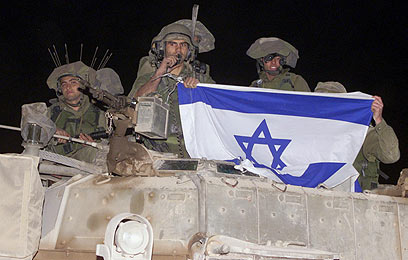
The night that ended two wars
Op-ed: Fifteen years after the Israeli withdrawal from Lebanon, there are those who still believe that the pullout was an escape and that we should have maintained our national dignity – even at the cost of thousands of dead soldiers on the way home.
He made the right and sensible decision, and with the help of his future rival, Northern Command chief Gabi Ashkenazi, he executed a remarkable operation, even if certain historians will think and write otherwise, and even if people with national pride will argue that our dignity as a state was critically damaged.
Withdrawals aren't photographed well. Festive parades with a removal of the flag while singing Israel's national anthem, "Hatikva," would have been more appropriate – but it was already clear to everyone, including Hezbollah, that the grains of sand in the hourglass of the Israeli departure from southern Lebanon were running out. Barak, as an election candidate, had declared that he would remove the IDF from Lebanon within a year – and the calendar can't lie.
A large part of the Israeli public, not just the media, saw the first Lebanon War, in the early 1980s, as an inappropriate war which could have been avoided, and the establishment of the security belt in southern Lebanon as a wrong and unwise military logic. In Barak's favor it should be said that even then, when the security zone was established, he spoke against that move and suggested a return to the international border. Our presence in Lebanon from 1982 to 2000 claimed the lives of 1,216 fallen soldiers. A lot of human life for, relatively, little security.
Those of us with a sharp memory remember that the preparations for the Lebanon pullout (building posts, paving ways, fencing, removing student transportations from the fence) began almost a year before the actual withdrawal and were watched by the South Lebanon Army (SLA) soldiers and their families, the residents of southern Lebanon and the terrorists from Hezbollah.
Even earlier, we somewhat failed in finding a solution to the Lebanese terror in the security belt, but the end began a lot before the end with protests by hundreds of women and children in the Shiite villages near the border, who walked, simply walked, towards the SLA posts. What should be done against them? Should we shoot them? Kill 50 of them? 100? 1,000?
Shaul Mofaz, who served as IDF chief of staff at the time, personally watched the incident and asked the diplomatic-security cabinet to set a date for the withdrawal. The cabinet decided to give the prime minister and defense minister the authority to set the date. The most important thing was to prevent a large number of casualties during the withdrawal – the withdrawal which the entire world was waiting for and which Hezbollah members were escorting with their eyes and with their weapons. It could have been hell for the IDF.
And it wasn't. While the IDF soldiers came home, 6,000 SLA soldiers and their families had to collect decades of their lives within hours, gather their family members together and escape as soon as possible to the Israeli border. It was crowded at the border gateway for a day or two. There was shouting, and there were television cameras which filmed the children's tears, the weapons which were mostly handed over to the SLA and remained on the ground, and the 5% cheese shipping container which was taken captive by Hezbollah.
Not a single camera filmed the casualties, the dead and the injured which didn't exist – and mainly, it was impossible to illustrate the sigh of relief heard from one end of the State of Israel to the other.
To this very day, mainly for political reasons, there are those who believe that the withdrawal was an escape, and that the national dignity was more important than dozens of dead Israeli soldiers in the fighting on the way home or while removing the flag at the Beaufort to the sounds of the national anthem. But that is how two wars ended in one night: The war of narrow-mindedness and the war of impatience.
So on behalf of those soldiers who are alive today and don't know who they owe their lives to, I'll just say one more word: Thank you.











